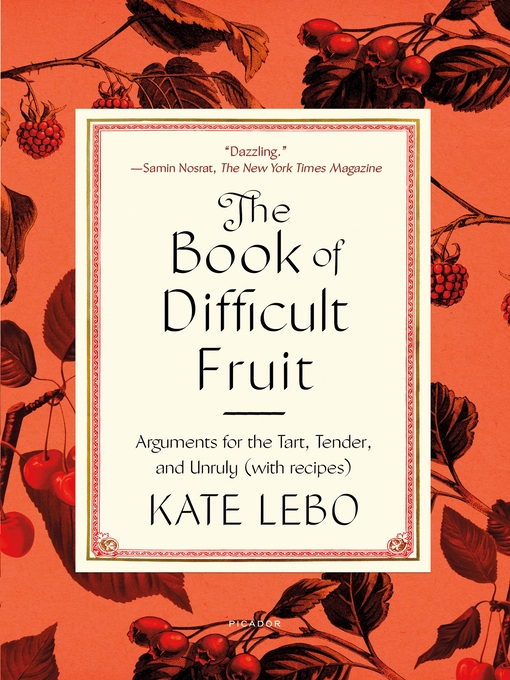Named a Best Book of the Year by The Atlantic, New York magazine and NPR
"Dazzling." —Samin Nosrat, The New York Times Magazine
Inspired by twenty-six fruits, the essayist, poet, and pie lady Kate Lebo expertly blends natural, culinary, medical, and personal history.
A is for aronia, berry member of the apple family, clothes-stainer, superfruit with reputed healing power. D is for durian, endowed with a dramatic rind and a shifting odor—peaches, old garlic. M is for medlar, name-checked by Shakespeare for its crude shape, beloved by gardeners for its flowers. Q is for quince, which, when fresh, gives off the scent of "roses and citrus and rich women's perfume," but if eaten raw is so astringent it wicks the juice from one's mouth.
In a work of unique invention, these and other difficult fruits serve as the central ingredients of twenty-six lyrical essays (with recipes). What makes a fruit difficult? Its cultivation, its harvest, its preparation, the brevity of its moment for ripeness, its tendency toward rot or poison, the way it might overrun your garden. Here, these fruits will take you on unexpected turns and give sideways insights into relationships, self-care, land stewardship, medical and botanical history, and so much more. What if the primary way you show love is through baking, but your partner suffers from celiac disease? Why leave in the pits for Willa Cather's plum jam? How can we rely on bodies as fragile as the fruits that nourish them?
Kate Lebo's unquenchable curiosity promises adventure: intimate, sensuous, ranging, bitter, challenging, rotten, ripe. After reading The Book of Difficult Fruit, you will never think of sweetness the same way again.
- Everyone Reads: Social Emotional Learning
- Lonely Planet Travel Guides
- Spotlight on: Mental Health
- Deaf Culture, Experience, and History
- Autism Awareness
- Employment and Career Resources
- Black Lives Matter - Books for Young People
- Celebrate National Native American Heritage
- Latinx Authors
- Anti-Racist Reading
- Schomburg Center Black Liberation Reading List
- Books to Battle Quarantine Sleep Problems
- Never, Never, Never Give Up
- See all useful topics collections
- eBooks with no wait lists!
- eBooks: Best 2022 Adult Fiction Titles
- Most popular
- Just Added
- Books in Spanish/Libros en Español
- SciFi Old & New, Contemporary & Classic
- Read-Along Books
- Popular Mysteries
- Try something different
- Why Wait? Always Available Classics
- Comics and Graphic Novels
- Escape into History: Historical fiction
- Manga for Grownups
- See all ebooks collections
- Always Available Audio
- It's Your Lucky Day! Audiobooks+
- eAudio: Best 2022 Adult Fiction Titles
- Modern Scholar Audiobooks - NO WAITING!
- Legacy Washington Audio Collection - Listen NOW!
- Most popular
- Just Added
- Spanish/Audiolibros en Español
- Stranger than Fiction
- Try something different
- Family Road Trip Audiobooks
- You can't hit pause on these thrillers
- Best Audiobooks under 3 Hours
- See all audiobooks collections
- 2023 Washington State Book Award Finalists (WSBA)
- Best of 2022: Adult Nonfiction
- Now's Your Chance!
- En español - lo nuestro
- Microhistories - Get down in the weeds with these intriguing titles!
- D-Day, June 6, 1944
- Unreliable Narrators
- Bibliotherapy
- Steampunk
- Dealing with Addiction
- Historical Fiction
- Presidents and Politics
- Laughing all the way to the bank
- See all eyes and ears collections



